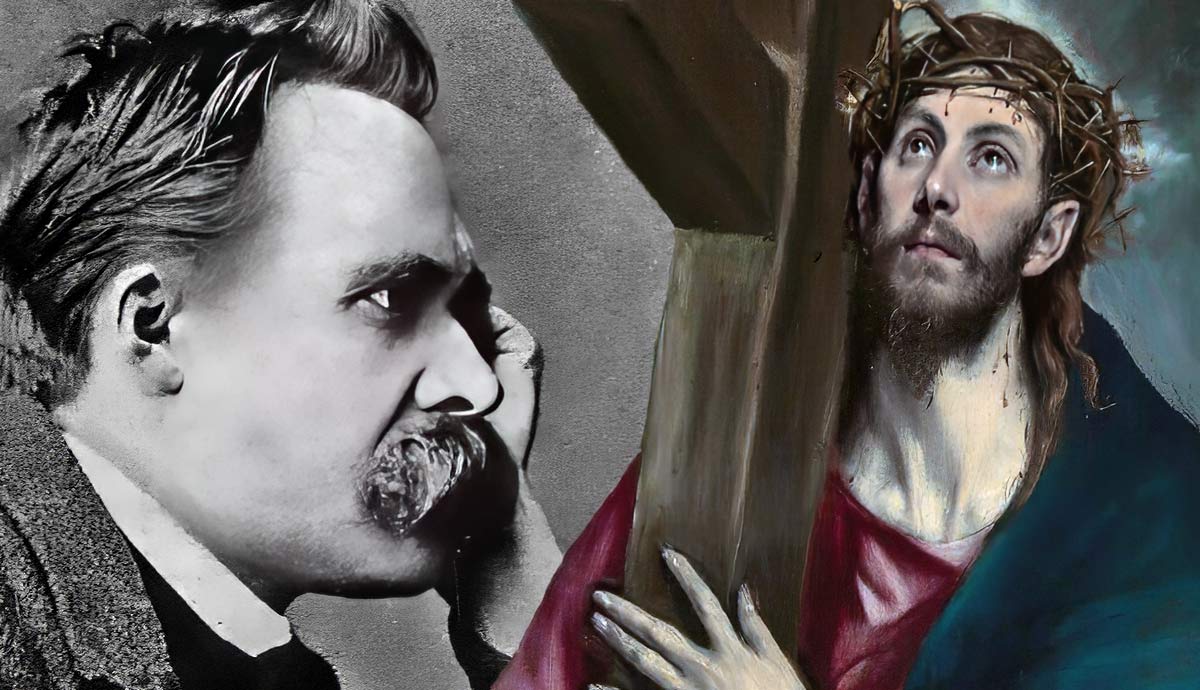
German 19th century philosopher Friedrich Nietzsche took a philosophical stance against many of the prevailing norms and governing institutions in the society of his time. The public and open stance he took against religion is perhaps one of the most famous. But did Nietzsche really hate Christianity? The reality is that his position towards Christianity was complex and nuanced, as we discuss below.
He Criticized Elements of Christianity

Firstly, it should be acknowledged that in many ways Friedrich Nietzsche was quite directly critical of Christianity. There’s simply no way of getting around it. Friedrich Nietzsche was highly critical of Christianity as it was practiced and institutionalized in Western society during his time. He was particularly critical of the bourgeois version of Christianity practiced among the upper classes – which he felt to be especially hypocritical – but he was also very critical of the uneducated version of Christianity at the same time.
The wider effect of Christianity on European culture – especially in the arena of morality and politics, but also in the area of art and intellectual culture – was also the subject of Nietzsche’s ire. However, Nietzsche did not simply reject or repudiate Christianity. In fact, it is essential to understand that his criticisms are highly qualified, and impossible to understand without a good understanding of Nietzsche’s own philosophy. That is what we will turn to in the next section.
Nietzsche’s Position Was Nuanced

One of Nietzsche’s core beliefs about Christianity was that it had contributed to a degradation in Western culture, and could yet pose an existential threat to it. Nietzsche believed that Christianity, along with other religious and philosophical systems prevailing at the time, had contributed to a cultural and philosophical “nihilism.” This is ironic, given Nietzsche is often referred to as a nihilist. Nietzsche saw this nihilism as a denial of life’s inherent value, an escape from the challenges of existence, and a suppression of individual creativity and assertiveness.
Nietzsche coined the terms “master morality” and “slave morality” to describe two different value systems. He argued that Christianity promoted a “slave morality,” which values traits like humility, meekness, and self-sacrifice. He saw in master morality the potential for a new kind of value – the so-called “revaluation of values”, with autonomy, individuality and courage at its heart. These aristocratic virtues were associated, in Nietzsche’s view, with Ancient Greece (a pre-Christian society).
A Critic of Ascetism

Nietzsche also criticized the Christian ideal of asceticism. Asceticism is the renunciation of worldly pleasures and desires. Although many people (Christians and non-Christians alike) see certain kind of asceticism as worthy and good, Nietzsche saw asceticism as life-denying and destructive. He believed that the Christian focus on asceticism was a by-product of their excessive fixation an afterlife and the rejection of bodily desires hindered the full expression of human potential.
Nietzsche Recognized the Historical Value of Christianity

Nietzsche was raised in a religious environment, and one of his earliest goals was to become a pastor himself. Although he came to seriously dislike certain parts of Christianity and to theorize about a society without it, he did not unreservedly hate Christianity. It is important to note that Nietzsche’s views on religion were not monolithic. He did appreciate certain aspects of religious and philosophical traditions.
At certain points, Nietzsche writes about religion – and Christianity in particular – in much the same way that Marxists write about capitalism. That is, religion in its present form may have had its day, but that doesn’t mean that it is regrettable religion existed at all. Indeed, it may be that the present version of religion and religious morality was a necessary step along the way to constructing a higher form of society.
Relatedly, although Nietzsche did approve of many aspects of Greek culture, Nietzsche doesn’t advocate simply reasserting those values in place of Christian ones. Rather, Nietzsche is interested in trying to create something completely new and valuable in its own right.
He Challenged Religious Values

Nietzsche presents a challenge to religious values, but that challenge is not intended to be wholly destructive. In fact, much of what Nietzsche has to say about religion should be viewed as a constructive challenge. Nietzsche does, for example, take Christ to be an exemplary way of living. It is what has been done with Christ’s life, and in particular the manipulation of his life by early Christians like St Paul, that Nietzsche repudiates.
This can be understood as a model for the way that Nietzsche wants us to treat Christianity. He doesn’t want to entirely negate it or deny that it has any importance, but he does want us to stop generalizing it and building culture upon it. Our failure to heed this warning would, in Nietzsche’s view, precipitate the collapse of Western culture as a whole.










